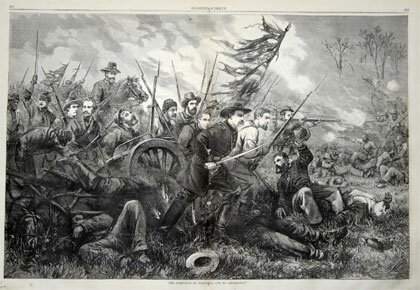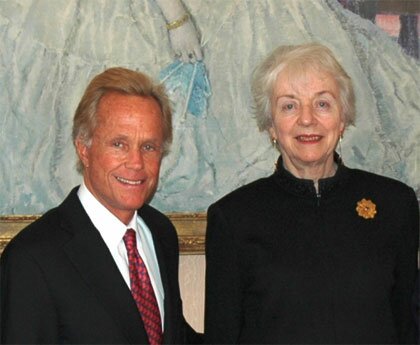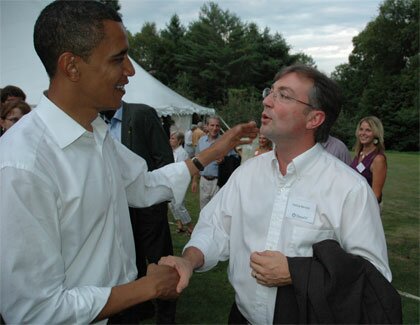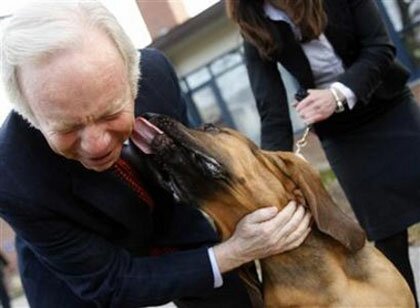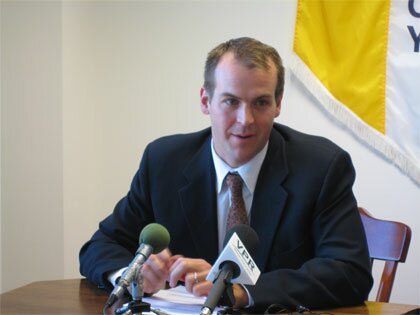THE VDB SIT-DOWN WITH ANTHONY POLLINA:
In Which An Admittedly Wary Democrat Confronts an Admittedly Charming Progressive
By March 15, 2008, certain things about the election cycle underway remained entirely uncertain — whether Barack Obama or Hillary Clinton would ultimately capture the Democratic Presidential nomination, to take one example. And whether that nomination would ultimately be worth anything when captured, to take still another.

But certain things had become brutally, painfully clear: while Progressive Anthony Pollina was running hard against Jim Douglas, Democrats were still waiting for Godot — not to mention Dunne, and Racine, and Sorrell, and Campbell, and most recently, Galbraith.
That would be Peter Galbraith — the man who helped quiet the Balkans — and he was said still to be locked in very serious ruminations about a bid. But March revealed muddy truths: either Peter Galbraith was not running after all, or he planned to run a campaign so unfocused and late out of the box as to make little substantial difference.
Political bloggers, of course, abhor a vacuum.
And so when Pollina’s camp contacted me about an interview, there was never any serious question about doing it. The questions, such as they were, revolved around the particular method: the timing, the focus, the purpose of the sit-down itself. Because it went without saying that the interview would be attacked from all angles, no matter how I went about it.
The very questions themselves would become proxies in the longstanding feud between the two Parties: Democrats would see only softballs, Progressives only beanballs.
Why, many Democratic VDB readers would demand, had I let Pollina misrepresent history and conceal his true intentions? Why, Progressive VDB readers would wonder, did I set out to covertly knee-cap the only man with a shot at beating Jim Douglas in 2008?
And the copious email I have received in advance of publication has only confirmed those suspicions.
The interview was a suicide pact, then, but I went at it with a fairly clear purpose: to air a series of longstanding grudges held by Democrats, with the idea of allowing Anthony Pollina to address them and, just possibly, put some of them to rest.
Inevitably and ironically, in the complex psychological interplay involved, a long interview could not help but engender more disagreements — but hopefully those would be fewer in number than the points of understanding we might reach.
And again, at every stage, I came back to the same stark truth: the Democrats have no candidate this time out. So if ever Anthony Pollina would have a chance to prove his long-standing assertion — that he is uniquely qualified to lead a “small-P” progressive coalition to victory against the forces of the status quo — this year would seem to be it.
One final note: this interview does not constitute an endorsement, nor should any of the comments or questions within it be seen as such. I tried my level best to come to it with an open mind, however, and I left it more than willing to hear Pollina make his case over the coming election season. I can only hope it will convince each of you to do the same.
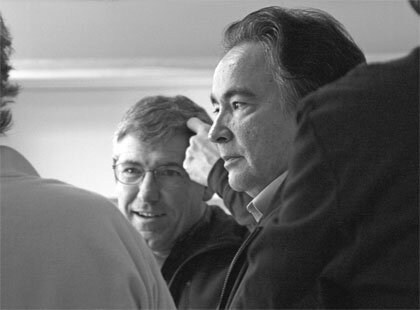
* * *
VDB: First of all, I wanted to congratulate you on being officially in the race — that seems like, for some reason, a huge achievement for people this year — and I wanted to tell you also that I had to admire the way you went about it: you had a pretty serious statement of candidacy and then you set a target figure, a hundred thousand dollars, and you made it clear that that was going to be a marker of the seriousness of the campaign.
Then you went out and raised that, and were able to report that back to people, and I think that’s had the effect you were after, which is twofold: to keep competitors out of the race, and to force a new consideration of the old dynamic between the Democrats and the Progressives and how they’re going to approach statewide office.
I’d like to start by asking you: that was then with your candidacy, the hundred thousand dollar target, but where are you now? Where does it stand now, not just in terms of money, but volunteer power, endorsements, all those things?
Pollina: Well actually — ironically because it’s actually right now — we are going to do an official kick-off celebration and —
VDB: Democrats for Pollina.
Pollina: Well, actually there are two things. Democrats for Pollina should be kicking off [looks at watch] almost as we speak, from what I understand, or sometime this morning.
VDB: I got forwarded an email on that from somebody.
Pollina: So that’s good. And that came out of conversations we had at house meetings and other places where people who are Democrats have said, “What can we do to help?” And we’d say, you know, “Talk to your State Committee member, write a letter to the editor,” and then we started saying maybe people should organize a write-in campaign or find a way to get the Democratic Party on board. So one of the good things that came about is this group of Democrats who are doing that. Putting up a website and —
VDB: I saw it. Bill McKibben is a part of it.
Pollina: Yup, he is.
VDB: He’s at the top of the list — which is a great headliner.
Pollina: And there are a number of, I guess, former elected officials whose names will appear on that list. There are other current elected officials who have made contributions and who have been helpful in one way or another. Some of them, it may take them a bit longer to make that support public. But I think that’ll happen. And we’re pleased to have gotten the support of the Democrats that we’ve gotten.
To back up to what you were talking about before, when we talked about making the statement that I was going to be a candidate and then trying to raise the money, and then opening a bank account, all of that — at every step in that early process, we actually kept the Democratic party informed. We literally called them up to say, “We’re opening a bank account today,” or “We’re gonna do this today.”
VDB: What was the response to those phone calls like?
Pollina: Mostly it was, well, actually to be quite honest, most of those phone calls were not made by me. They were made by someone in the campaign. And mostly the response was just, “Okay, thanks for letting us know.” I certainly have been to meetings with Democrats, the Party Chair [Ian Carleton] and others, and you know, talked about staying in touch, wanting to find a way to move forward together.
Those conversations were just — I don’t want to say just in the sense of being negative — they were good conversations. I was never quite sure if we were getting anywhere with it, but I thought it was important to keep that door open. But you find, after a while, that you want that door to swing both ways, and sometimes we’d leave those meetings and wonder if we were really being heard.
VDB: I wanted to go back to the roll-out of your campaign. I said before that it was well-handled: pretty measured, but with a definite sense of building momentum and commitment. But there was one moment that I thought was interesting where you said — I’m pretty sure it was you yourself, but maybe a spokesperson — that if an “A List” Democrat came out, you’d rethink your decision to run, but in lieu of an A-Lister, you would be running.
The odd thing, to me then, was that Doug Racine didn’t fit that definition of a top-tier candidate who would make you think twice. So who did you have in mind, or what scenario did you have in mind when that message was going out?
Pollina: Well, I don’t know if I had an individual in mind that I could point to, but at the time Doug Racine and Matt Dunne and, I guess, John Campbell were thinking about it. It’s possible that if any one of them had come out enthusiastically and talked about a way to coalesce and work together, they could have presented some possibility of being that person.
What I was also trying to make clear was that it had to be someone that we as Progressives could support, as well. So that wasn’t a decision just for me to make, is what I’m getting at.
You know, I talked with Matt Dunne, and I talked with John Campbell, and talked with Doug Racine, and more and more I got the impression that those people were not going to run. And then the other thing that happened simultaneously is that I was making calls to Democrats and others and county chairs and people on the state committee, and a number of them — in fact, there was one particular Sunday when I was calling, and I called three or four or five of them, and I would say three in a row said the same thing to me: “Well I might support you, we feel the same on issues,” but then they said, “The bottom line is that someone has gotta get out there and start doing this. The Legislative session is beginning, Jim Douglas is out there, we need a candidate who’s going to start talking about issues and taking him on.”
My wife was there at the kitchen counter with me, and I said to her, “Well, this is kind of interesting.”
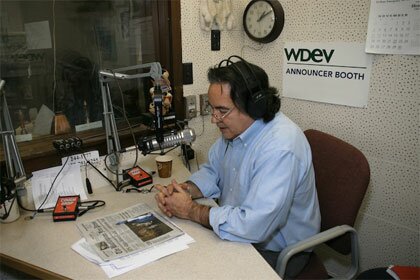
VDB: Exactly. And when the Douglas budget was rolled out, there was no one there to respond to it but you, no one to be the go-to person for a response in the media but you. The Vermont Democratic Party has done a good job putting out their collective response and their ideas on the subject, but to have a single adversary out there was a good thing.
Especially when it came to things like capital gains taxes, and eliminating that exemption and then what would happen to that $20 million dollars — you and Jim Douglas have a very clearly defined difference on that. And I think that reflects not the ideology of the Progressive Party versus Jim Douglas, but really the Center-Left against the ideas of Jim Douglas.
Pollina: I think it reflects Vermonters versus Jim Douglas, quite honestly. Because one of the things I find more and more, and this is no surprise to any of us who get around the state or who do organizing with people, I think there’s broad agreement amongst Vermonters on a lot of things. And more and more I think that Jim Douglas is just out of touch with most Vermonters.
The problem is that no one has been there to call him out on these issues. For instance, with the capital gains [exemption], you know, we can either give the money back to wealthier people particularly, in terms of giving them tax rate cuts, or we can use that money to leverage other money to take care of the needs that we have.
So I proposed taking $5 million of this $20 million, and there will be more than $20 million in a lot of years, using that $5 million to leverage another $75 million — the $5 million to pay the debt-service on bonding — and then using that $75 million to do the work on roads and bridges that we need to do. So in that sense, you’re saving jobs, you’re saving money by dealing with infrastructure before it gets even worse —
VDB: You’re preventing a Minneapolis-style tragedy —
Pollina: It is a disaster waiting to happen. I mean, our roads and bridges are in terrible shape. And you’re also helping to discourage the need for local property tax increases by taking care of problems before they get pushed more and more on local communities.
VDB: Now, Jim Douglas immediately through his spokesman came out and said that your idea of using that money for roads and bridges represented a potential tax hike because closing the capital gains tax and not returning the money to taxpayers meant that essentially you were raising taxes. And that’s going to be part of a broader set of issues I wanted to get to in a minute.
I did want to, as I told you I would, channel some of the [takes a full two seconds to settle on proper word] wary Democrats out there —
Pollina: Sure.
VDB: Because they are out there. And as well they would be, because the Progressives and the Democrats have been eating out of the same bowl for any number of years now, and so what I’d like to do is forward some of the questions that I hear people raising, and just have you deal with them one by one, and see if they can be put to one side.
One way to get at this is to go back to the re-election of Howard Dean, his last election in 2000. He was being pummeled on civil unions by Ruth Dwyer and the Take Back Vermont movement, and there were a lot of people who felt that a challenge to Dean from the Left that year was somehow out of bounds, that he deserved the support of the whole coalition. You went in that year and you drew about 9.5% of the vote.
Now, in 2002, there was the race with Brian Dubie and Peter Shumlin. And in each race, you disputed the spoiler label and your slogan here and there was “Vote your hopes, not your fears.”
This time around, tables are essentially turned: you’re out of the gate very early, Democrats are still fumbling for a candidate and it looks as though they may not come up finally with a serious one. But your pitch this time around is a lot closer to the unity pitch the Democrats normally give to Progressives: “Look, we agree on 95% of the issues, we need to beat X Republican, and in order to do that we should stay united.” You’re saying something very close to that now.
How do you respond to the criticism that Progressives or you specifically are really framing each election not in accord with ideals, necessarily, but what happens to advance the interests of your party statewide, at a given moment?
Pollina: Well, I think a couple of things. In the race against Howard Dean, for example, just to go back there, when I announced I was going to run it was actually before the whole civil unions debate essentially began, if I remember correctly.
I know that the media and a lot of onlookers suggested that I actually won most of the issue debates, when it came down to talking about the issues, and there were a lot of things that I thought needed to be talked about at that time. A third of Vermonters were making $8.50 an hour, we had the most expensive state colleges in the country, we had lost half our meat processing plants in the state of Vermont.
So depending on how you look at it, there were a range of issues that I don’t think would have really been talked about if I were not in the race, and I think those were important.
In the 2002 race, let’s say, or in any race, I still think that there are a lot of issues that don’t get raised unless there are enough people in those races who believe in them. I still think that Vermonters need to be encouraged to vote their hopes and not their fears, quite honestly. I think — coming up to where we are now — Doug Racine and Peter Clavelle and Scudder Parker, they’ve run against Jim Douglas and they’ve done it essentially with the support of Progressives, and they’ve done it in one-on-one races [raises hand to head off the obvious rejoinder] — not exactly true, I know, because Con Hogan was in one race, etc. But essentially they were one-on-one races. And they were not able to defeat Douglas.
And I think that sometimes to defeat an incumbent it takes a different approach. My thirty years or more of coalition building and working with people around the state gives me not only the kind of name recognition and connections, but I think it gives me the experience to talk about issues differently than some other folks have been able to. I actually think there’s a benefit to having someone who’s something of an outsider, meaning outside the legislative process.
I’ve worked in the legislature with, you know, Republicans and Democrats and Progressives on a range of issues, but I’ve spent most of my time outside that process, at the community level, as an organizer. And I think that I could be more effective in challenging Douglas because of that grassroots perspective.
VDB: So let me just give you a hypothetical. Suppose an email goes out tomorrow morning saying that X Democrat is coming out, and they’re coming out specifically because you’re not covering X, Y, or Z issue. Let’s face it, no one can emphasize every issue in a single race.
And you go to them and sit down with them — this person we’ll call John Smith — and you say, “John, look I’m really dedicated to covering X, Y, and Z,” but they say, “No, I don’t see that, so I’m going to go ahead and run.” Would you still argue, from where you now sit, at the head of the frontrunning campaign, that this person should go ahead and run?
If you look at the two latest WCAX polls, they’ve shown Democrats Matt Dunne and Peter Galbraith running ahead of you, each at around 22% or so. And that steady number seems to point not so much to the name of the individual but a party recognition kind of thing. So if you did have a Democrat, even a lesser known candidate, they could easily take 15% or 20%. Would you still say to that person, “Come on in, I’m all for more choice, let’s hash out the issues publicly,” or would you say, “It would be better, all things considered, if you worked with me as the candidate”?
Pollina: Two things. I would not discourage anyone else from running —
VDB: Okay.
Pollina: — having been in that position, and being a believer in democracy. I would not do that. So I would welcome them into the race. I would certainly be willing to talk to them about working together in a coalition, in a sense, prior to their getting in. But if they chose to enter the race, I would welcome them into it.
And at this stage of the game, I think that our campaign has moved far enough along that there is simply no way it is going to be derailed. It cannot happen. Once you go through the process of deciding to enter a statewide race, it’s a major family and personal decision, not one you take lightly.
VDB: By the way, I love the end of the interview you did with Vermont Indymedia [“The Man Who Would Be King”], at your office, and at the end your wife comes in and says, “I thought you were going to call me when you were done,” and you say, “Well, I’m not quite done,” [laughing] and she says, “Yeah, well, I’m pretty ready to go.”
Pollina: [Laughing] She was done.
VDB: Continuing along this disgruntled Democratic line —
Pollina: [Still chuckling] Sure. I met with Barre Town Democrats on Saturday morning, you know, so we talked about a lot of this.
VDB: All right, you said in that interview, very well-done interview with Vermont Indymedia, you said, “Is there a way that Vermonters can come together and, for lack of a better work, unite around a candidate to build a grassroots movement to defeat Douglas?” But then you say that while you could do that — unite the Democratic and Progressive factions — it doesn’t work the other way around: “I quite honestly think that the list [of acceptable Democrats] is relatively short for most of the Progressives that I talk to.”
I think this gets to the root of much Democratic frustration with the Progressive party, and the campaigns that they tend to run: the default dismissal, the notion that Democrats are just Coke to the GOP’s Pepsi, tainted, lacking in ideals, impure, unworthy of Progressive votes. And hence we should always have a Progressive choice on the ballot, but don’t necessarily need a Democratic choice on the ballot. Now, the idea that Peter Clavelle or you yourself can unite the two parties, but that it doesn’t really work the other way, that sticks somehow, with a lot of people.
I look at someone like Matt Dunne, who does a great deal of work on issues around poverty, who runs service politics campaigns, so that the force of the campaign itself is redirected to projects that benefit the elderly, the disabled, or the community at large — I know Dunne tried as hard as he could to persuade Marvin Malek [Progressive challenger in Dunne’s 2006 attempt to unseat incumbent Brian Dubie] not to challenge from the Left. Malek paid him no heed and ran in any event. What about that idea, that Progressives — Clavelle and yourself being the notable two — come forward with the idea that they’re uniquely qualified to lead this large coalition, but Democrats can’t do so because they are, by definition, as Democrats, further from pure ideals?
Pollina: First of all, what you and I are really talking about here, and what Vermont is talking about, is political change, and I think that’s healthy. Long-term political change, and it does take time for these things to evolve. We’re in the middle of that process, and we’re all going to be better off for it, frankly, regardless of where it turns out. We have many, many times — countless times, I guess you’d say — Progressives have supported Democrats.
Doug Racine is a prime example. I was encouraged in 2002 to run for governor, after running in the previous race against Howard Dean, and I chose not to because Doug Racine was going to be running for Governor. We did support Peter Clavelle, most Progressives essentially supported Scudder Parker —
VDB: Can I just stop you there? So you’re saying you didn’t run against Racine because you thought he was the kind of Democrat who you thought could unite that coalition, but you ran against Shumlin that same year because you think he’s not. Is that what you mean?
Pollina: Well, I didn’t run against Shumlin, I ran for Lieutenant Governor.
VDB: Well, you see my point.
Pollina: In fact, Peter Shumlin encouraged me to run for Governor that year. That was kind of ironic.
VDB: And this time around, he’s encouraged you too, from what I understand.
Pollina: Right. This time around he’s encouraged me to run for Governor, so I’ve given up trying to figure him out, to be perfectly honest. But I ran for Lieutenant Governor because I was encouraged to by many people who said, “You have a message and you’re committed.” So when I decided in 2002 not to run for Governor, the race for Lieutenant Governor seemed like sort of a [hesitates for a few seconds over word choice] sort of a macho one, if that’s the right word. But it seemed like a good place to bring my energy, and the people who wanted to be a part of that campaign.
VDB: Just one thing, though. Earlier, on the line about the “A List” Democrat, you said that Doug Racine wasn’t an A-List Democrat of the sort that would keep you out of this 2008 race —
Pollina: Oh, what I said was that Doug Racine decided not to run.
VDB: Well, I think that was back when he was still considering, when his trial balloon was still up. But that’s neither here nor there. So to your mind, there are candidates who come along who are uniquely qualified to bring the two parties together —
Pollina: We hope. You don’t really know until you’ve tried.
VDB: — then for me the question becomes this. You noted in an article about the WCAX polling, you noted something that I think is self-evident, which is that voters out of force of habit, when the pollster mentions the word “Democrat” or “Progressive” or “Republican,” are responding to the party affiliation not the individual or that person’s current message. And you argued that a good campaign based around change could unsettle that equation, rendering early polls like the WCAX poll essentially meaningless.

While I think that’s true, I’m wondering about your decision not to pursue the Democratic nomination. From what I understand you’re going to be listed solely as a Progressive.
Pollina: [Putting a hand up] Well, we’ll see. That’s an important question, so let’s talk about that, and back up for a second.
VDB: All right.
Pollina: When it comes to these early polls the only other thing that I did say, which didn’t get picked up on, but which would have been very pithy if it had [chuckles], would be something to the effect of, if you believe in early polls you should talk to Mitt Romney and Rudy Giuliani and Hillary Clinton.
VDB: Man, especially Rudy.
Pollina: Right. Because early polls are not always a good indicator. The other thing that I want to mention with Peter Clavelle, just so we don’t forget, what Peter Clavelle did — at least the way I would characterize it — was that he essentially left the Progressive Party to become a Democrat. And my perception, although I think it’s a fairly commonly held one, is that that started him off on the wrong foot. Because some of his friends from the past were discouraged, you know, by his decision to do that.
VDB: Yup.
Pollina: And then there’s the question of whether he was ever fully accepted by the Democrats once he’d done so. It’s neither here nor there for me to say for sure, but I wonder about that. In order to run in the Democratic primary, I would have to leave the Progressive Party —
VDB: Because of the charter rules of the Progressive Party?
Pollina: No, no, it’s a state law. You can only run in one primary. We’ve gotten a lot of emails from people saying, “Hey, you should run in both primaries,” but we looked into it and many years ago there was a decision made by the Attorney General that said you could run in multiple primaries, and I think it was done in the case of George Aiken, where he asked for an opinion. So a number of Democrats sent us this thing, but we did some research and found that in the 1970’s that was changed.
VDB: But you could accept another —
Pollina: You can only have your name on one primary ballot; that’s a technical way to put it. So you could run in the Democratic primary, and receive write-in votes in the Progressive primary, or vice versa. Or I would presume, although this would go according to party rules, that you could run in the Progressive primary and simply be endorsed by the Democratic State Committee.
Now, I’m not going to say this right, but it’s different in the case of somebody like Bernie. Bernie’s an Independent, so he’s essentially not in a primary, so that’s why it’s easier for him — not easier, I don’t want to use that word — but he’s able to gain the Democratic primary victory, I guess, without giving anything up because he’s an Independent to start with.
So to run in the Democratic primary, I would have to leave the Progressive Party, and I don’t think it would be appropriate. I don’t want to leave the party that I’ve worked with for years, that’s number one. And I would also argue, and I think it’s true, that if I were to announce tomorrow that I was going to run in the Democratic primary, there are leaders of the Democratic Party who would immediately say, “This person’s a hypocrite, he’s trying to invade our party, after criticizing us for all these years he wants into our party.”
And I don’t feel a need or a desire to continue to have that argument with the Democratic leadership.
Now, I go around the state — I was in a meeting Saturday organized by the Barre Town Democrats — and there was a lot of support there. Or these folks who are doing this thing today, these Democrats for Pollina. I’m going to meet with the Windham County Democrats in a little while, we’re going to meet with the Addison County Democrats. Had a great house meeting in South Burlington a little while ago, which was primarily Democrats, people who are on the State Committee and all that kind of thing. There’s a lot of support out there.
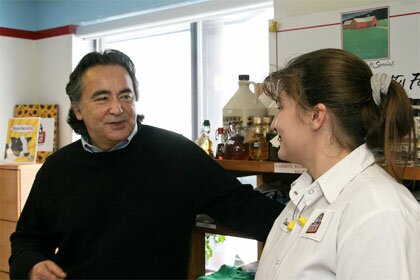
But there are folks in the leadership who are sort of having a harder time getting themselves adjusted to this decision.
What we’ve proposed is one of two things. If there is a way for the Democratic State Committee to endorse me, we’re certainly open to that, and I would of course accept their support.
VDB: Could that be registered on the ballot?
Pollina: No. [Thinks about it] Well, if they endorse you, yes.
VDB: Then you could have two affiliations after your name.
Pollina: [Nodding] Then you’d have two affiliations. That’s my understanding.
VDB: It seems to me that that’s actually the biggest consideration, what the affiliations beside the name are, when you’re talking about the majority of Vermonters for whom all of this is inside baseball, who haven’t been cued in and will look at the Party designations for some kind of guidance.
Pollina: Right. And that’s what I think inspired these folks today to talk about a write-in campaign.
VDB: Can I just stop you there, because that gets perfectly to something else I wanted to talk about. In that same interview I quote before, you very clearly broke out what you called “grassroots Democrats” from I guess what you’re calling the leadership. But you also framed that group you want to get away from another way, pretty narrowly, as people “who live in Burlington who have a lot of money who tell Democrats what to do.” You went on to say that “Those wealthier people who like to pull the strings are not necessarily committed to defeating Jim Douglas.” And you said why would I talk to those people, I don’t even know who they are. Without getting into too much of a food fight here —
Pollina: [Laughs a bit uncomfortably]
VDB: — I wanted to ask you about that, because I think that when you talk about uniting the coalition, and bringing everybody forward . . . I just don’t know how you do that if you say that you’re not interested in talking with people over a certain income level. That seems to me just to reverse what’s wrong with the situation now. Because you talk very eloquently and very knowledgeably about the concerns of working-class Vermonters.
But it seemed to me that somewhere in the assumptions beneath that answer was a sticking point when it comes to dealing with groups of Vermonters on the broadest scale. How would you respond to that?
Pollina: [Another small laugh] Actually, by clarifying what I meant. Because I’m now remembering when that question was asked, and I think the context was something like, “You don’t seem to be talking to those leaders of the Democratic party” —
VDB: I think the phrase the questioner used was, “The powers that be.”
Pollina: Right, something like that. And my response, partly, was “Why would I be talking to those people, I’m talking to people out here.” So I didn’t mean, sort of, wealthy people around Burlington. What I meant was people who were trying to pull the strings in terms of money for campaigns, because I thought that was the context of the question.
If you want to be a serious statewide candidate, again — and I honestly don’t know who these people are — but clearly there are people you’re supposed to talk to, who say, “I’ll raise you a hundred thousand, I’ll raise you another hundred thousand,” and we will be the ones who shape your campaign. So it was really that small circle of people that tend to control the money that goes to some campaigns that I was referring to.
VDB: That makes a lot of sense, because you have two claims to fame, as far as I can see, with campaign finance: helping to push through the legislation itself, but then utilizing it, and being the first person in the state to have their statewide campaign funded by that. You raised [to run for Governor in 2000] and correct me if I’m wrong, about $35,000 in small donors —
Pollina: You had to raise, I think it was a total of $35,000 from 1,500 people, in no more than $50 increments. And no more than a third from Chittenden County or something to that effect. [Laughs at the thought] It had to be spread out. It was a challenge.
VDB: Just really quickly, what do you think of Jim Douglas vetoing campaign finance legislation last session, on the grounds that it was “incumbency protection”?
Pollina: That made me laugh, I have to say. It shows, number one, how out of touch he is with the real world. Most people would prefer to have campaigns not cost a lot of money, because most people know that they don’t have a lot of money to give to campaigns. And if they’re not giving it, someone else is.
You have to laugh when someone who’s been in office his whole life, and is an incumbent, portrays campaign finance reform as incumbency protection. Incumbents don’t need any protection — they have access to the money, they have access to the media, they access to their party apparatus, they have access to out-of-state money.
That’s an example of the kinds of things I could not wait to debate him over in front of an audience. This is the way in which Governor Douglas has been able to shape the debate, and in a sense twist things around.
VDB: A very Rovian use of words.
Pollina: Yeah, exactly. Just like when he’ll take anything you say, and accuse you of trying to raise taxes. And if you don’t challenge him directly on it, it just goes right by the public. You have to be willing to stand up to these people and say, “That’s not true.”
VDB: That’s exactly where I was going next. Peter Clavelle had what I thought was a good initial vision for his campaign [in 2004]: built around health care, he had a good plan, at least one that would be a good start that would be knocked around in the legislature, but a good starting blueprint. And he rolled it out at a press conference, and the first question was, “Doesn’t this plan constitute a tax increase,” and he famously — now infamously, really — went deer-in-the-headlights, and stuttered through his denial. Douglas made a single attack ad with that footage, and it was lights out for the campaign.
Clavelle came forward from the Progressive Party to be the Democratic nominee; in Douglas’s frame, that was a takeover by the extreme Left, not just your average tax-and-spend liberal but a tax-tax-spend-spend liberal.
Now, in your case, you did an interview with Democracy In Action in 2002, during your run for Lieutenant Governor, and I went through and did a quick count — there were five major areas of the budget that you said were underfunded or seriously underfunded, grouped around education, the environment and agriculture. When I read something like that, I imagine Jason Gibbs rushing into the Governor’s office to show him, and then they chest-bump and high-five [Pollina cracks up]. Because they’ll say, “How can Pollina possibly propose these things without raising taxes?”
So my question is: Knowing for a fact that that’s coming — Douglas is already on record several times saying that you’re advocating tax hikes — I guess I’m hoping that you have something in mind for aggressive, immediate pushback, something besides just saying, “No, I’m not.” Which hasn’t been a big winner for challengers in the recent past.
Pollina: I think — this is something I’ll be talking about over time — but I think you start by talking about reducing the cost of living for Vermonters, and you explain to people that while no one wants to raise taxes, no one wants to pay taxes, taxes are not the largest expense for most Vermonters.
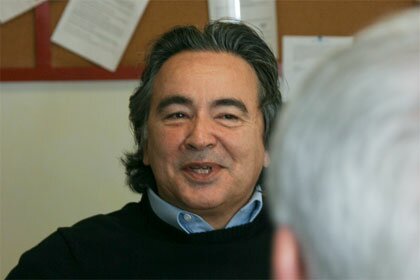
If you look at the cost of health care, cost of housing, cost of energy, all of those things are much larger burdens on the average Vermont family than property taxes. Cost of health care has gone up 10%, 15%, 20% per year, price of gas has tripled. That has not happened to my taxes. So while taxes are important to the conversation, Jim Douglas tends to use taxes as a way to deflect our attention from other issues that really are bankrupting families.
So I think what I would do is focus on overall reduction in cost of living for Vermonters, by making certain investments and certain policy adjustments that hopefully do that.
You know, you could change energy policy, and in the longer term reduce the price of energy. When it comes to health care, rhetorically what I ask people sometimes is this, “If you had a choice, cutting your property taxes in half or cutting your health care premiums in half, which would you prefer?” And they take the health care reduction, because it’s a bigger burden going up more rapidly.
You would remind people that we already pay for 60% of our health care through public funding of one sort or another, you tell people it’s important to get the burden of health care off businesses, so that businesses can actually pay higher wages or make more profit. And you ask people whether it’s important to them whether what they’re paying is a premium, a fee, or a tax — let’s all pay premiums based on our ability to pay, let’s have that conversation.
Bottom line is that, people want it to cost less. And if they agree with that, then I think we can sit down at the table and figure out ways to make it happen. But I would not allow Jim Douglas or anyone else to simply dismiss the cost of health care by using the tax word or any other word.
VDB: So, from that same [Democracy In Action] interview, you say, “On the one hand you don’t want to raise [Vermonters’] taxes, but on the other hand you want to reduce some of those costs — housing, health care, energy— as well.” Now, Peter Shumlin began the session by saying that Vermonters had essentially been taxed to their limit — a bold move, but once he said that, Jim Douglas seemed to have him in a very tight rhetorical box. Every time they came forward with anything, the expansion of Efficiency Vermont, say, Douglas pounded them.
In your case, are you saying that your fundamental thrust for middle- and lower-income earners be flat, and to reduce costs? And if so is the money to do that going to come from upper-income earners, and institutions? I know you’ve suggested mandating that institutions put a couple percent of their portfolio in the state —
Pollina: [With some evident surprise]Well, you do a lot of research.
VDB: Oh, always. But can you expand on that, where the money you’d need would come from?
Pollina: Going back to what Senator Shumlin said, I generally don’t take solutions off the table before the debate starts. I wouldn’t walk into the Legislature and say we’re not going to talk about raising revenue, or universal health care, or investing in colleges, whatever it might be. I would walk in with a more open mind. One of the things that’s hurting Vermonters, right now, is that we have not been allowed to think creatively and really put solutions on the table.
Jim Douglas and I live in two different Vermonts. In his Vermont, it’s too expensive to live, kids want to leave, we can’t fix the roads, nobody wants to be here. I live in a Vermont that is full of really wonderful people, has a great quality of life, great workforce, good public schools, creative people. I want to bring those people to the table, to start talking about what we need to do to get this state moving again, because I think with Jim Douglas we have essentially been wasting time and losing money.
We are not attacking the challenges that we have. These potholes out here are not going to fix themselves; we have to find the revenue to fix them. Our state colleges are not going to get more affordable if we do nothing and just leave them alone. Health care is not going to resolve itself. It frustrates me, and I think it frustrates a lot of people, to hear the Governor and legislative leaders say, “Well, we’re not going to talk about that.”
Just as an aside, I was speaking to a group of Democrats over the weekend. Probably twenty people in the room, and we were sitting around the table, and they included some members of Boards of Selectmen, and whatnot — and it was very interesting to me because out of those 20 people two of them asked me if I would be willing to talk about raising taxes, because they saw needs for that. In each case it was a little different, but in both cases the issue was transportation. I was really a little surprised.
One of these two, the Select Board member, said, “You know, we do the best we can, people support their budgets, but somebody’s got to engage us in a conversation about how we raise the money to fix the roads. It’s getting worse and worse.”
So, I guess, what I would say is this: Do I want to raise taxes? The answer is no. Do I want to solve problems? The answer is yes. Are Vermonters willing to look for revenue to do necessary things? The answer is generally yes.
VDB: Just to stop you there. Two ways to look at this. One is that Walter Mondale, as far as I know, was one of the few Presidential candidates to say prior to the election, “I will be talking about raising taxes, because it’s necessary given the state of the budget,” and his opponent demagogued him into the ground on that response.
The other way to look at it, at your framing of it, taking Vermonters back to the kitchen table to have an entirely new conversation about the disposition of all our resources — it begins to look, especially in the context of the current Presidential debate, as though you’re talking about very fundamental, sweeping change, as opposed to the token change that all candidates offer on the stump.
Do you think that’s a fair assessment? That you’re talking about — not instantly but over the course of a Pollina governorship — asking Vermonters to reconsider the basic tax structures, basic health care structures, and looking at them not in isolation but as parts of a whole pie, and seeing if they’re happy with the current configuration?
Pollina: Very much so. What I find people saying to me is, “Call it a tax, call it a premium, call it a fee, just make these things more affordable.” Let’s not be afraid of the words we use. We’re paying for most everybody’s health care, right now, you and I are doing it, probably through insurance premiums and our taxes, we are doing that. So let’s get that out on the table and talk about doing it in a way that is sensible overall.
And what will make this debate easier, frankly, is that Jim Douglas has just been so bad at responding to problems. You look at George Bush it’s the same thing: the reason why so many people are interested in change is that we’ve seen the failure of George Bush. And we’ve seen the failure of Jim Douglas.
If you were to ask people, tell me the two things that Jim Douglas has done well, or has done right, or made Vermont more affordable, I don’t think there’s an answer to that question.
VDB: Just to go back to something I mentioned before, your proposal to mandate — call it a 2% investment — from major institutions in the state, places like Fletcher Allen, UVM, or National Life of Vermont, which was another one you mentioned. Again, I could foresee a memo shooting out from the Vermont Republican Party portraying this as anti-business or creeping socialism. How would you frame it, how would you roll it out, and bring along some of these institutions, because I think if you bring them along from the beginning then the GOP talking point becomes moot.
Pollina: Well, let me say first of all that National Life is different from those other institutions because it’s a private company —
VDB: Yeah.
Pollina: — but you’re right, I did mention National Life in that interview. I think you build a base of support for the idea, and you get people involved. With this “Two Percent for Vermont” idea, what I would explain to people are two things. These institutions are to a large degree relying on our tax dollars, we’re paying for them. And I love them, don’t get me wrong. It’s not a criticism of them.
VDB: And UVM could use some more of those tax dollars, by the way.
Pollina: [Laughs] Bob Clark will tell you that I’m the only one who even talks about trying to elevate that as part of the debate.
VDB: You make a great related point on prison spending, that we invest a lot more in our prisons than we do in higher education.
Pollina: And as expensive as UVM is, it’s cheaper than going to prison, let’s face it. [Laughs, gestures around the office] And probably more fun, right?
VDB: Just barely, sometimes.
Pollina: I can’t say this about Fletcher Allen, but I know with UVM, we’ve had already had the debate about what not to invest in. Don’t invest in tobacco and don’t invest in South Africa, Darfur. All I would simply be asking them to do is invest in Vermont. It’s like teaching your kids. You don’t want to just say don’t do the bad things; you also want to say we want you to do some good things.
And it would be a fund, they would get a return on it. This would not be taking money from the institutions; it would be asking them to invest in an equity fund here, rather than in an out-of-state pharmaceutical company. So there would be a return, it might be less.
But the other thing that we all understand is that these institutions thrive in a strong economy. You know, UVM wants good jobs in the area. We want to be able to invest in businesses so that young people, graduates, stay here. This would be showing a commitment on the part of the institution to help build an equity fund to invest in local business. And I’ll tell you that it’s a concept that’s quite popular when I talk about it, across all party lines.
VDB: It’s the sort of thing you wonder why it isn’t already being done.
Pollina: And I’ve also had a man, a well-known Republican, former member of the Douglas administration, say to me, “You’re the only one who’s making any sense when it comes to these economic development policies.” And what I’ve said is that once institutions are doing it, then the Governor would make it clear that he was going to meet with National Life and ask them the same question, would they invest a small percentage of their portfolio in Vermont.
VDB: Quick clarification. You say, “ask them the question,” not mandate.
Pollina: It would be optional for them.
VDB: Because they’re a private company.
Pollina: Sure, sure. But if the Governor was willing to talk to them in the right way, and if there was a public mood that made it clear to these entities that this was something the community would really appreciate, I have a feeling that these companies as well would be willing to make a commitment to Vermont because they support Vermont and Vermonters. They would see the benefit.
VDB: Okay. That’s great. Let me just go to the second note of the two-note Jim Douglas re-election strategy. The first note is the series of ads accusing the opponent of being a wild-eyed tax-addict.
The second is to pick up on some hot-button local security issue. So in his first run, against Doug Racine, it was heroin, and what he called “a Megan’s Law for drug dealers.” What Douglas said in that race was simple: “We need a Megan’s law for drug dealers, because heroin is here, it’s scary, and our children need to be protected.” And Racine was saying was that we didn’t need a law like this, that we were doing pretty much okay on the problem as it stood. Not hard to see how Douglas might pick up that final 8 or 9% he needed among last-minute deciders.
Then it was sexual predators, and civil commitment. On civil commitment [holding sex offenders past the stated term of their sentence], Scudder Parker got crunched in precisely the same way: essentially arguing for the status quo on a hot-button issue, while Douglas dropped his voice into low register and said, “Look, we need to protect our children, and I’ll go that extra step.”
Now, you know you’re going to be running up against that —
Pollina: Sure.
VDB: — it’s just yet to be framed yet, what this tough-on-crime issue will be. And when that happens, as with the tax argument, I’m assuming you’re already thinking through how to make the argument on it that you want to make. Without going into the fear mongering aspect of it, how do you plan to make that affirmative argument yourself, that a Pollina administration will not see criminals loosed in the streets . . .
Pollina: [Laughing] Couple of things. One, without going into detail now, I would tie in economic security to public safety, because I believe the two are related. If you are providing — I don’t want to say services necessarily — but when you are providing a decent life for young people, they’re more likely to engage in behavior that’s not criminal. I really believe that. Again, a couple of things, so bear with me.
I would make the argument about putting more kids in college rather than putting them in prison. When you’re in ninth or tenth grade, and you hear your parents saying they can’t afford to send you to college, you’re a little more likely to not worry about doing your homework or getting out of high school. So I think that that is part of it.
Another part has to do with how we engage kids at an early age. [Hand up quickly to hold off the follow-up] Right now I’m talking, I know, mostly about kids and that’s different than the question of sexual predators — but how we engage kids, when they’re younger, and I would discuss the idea that right now we’re not giving our public schools enough moral support and respect. We’re not allowing them to be creative enough, to actually meet the needs of all our kids. Are we providing enough opportunities for kids to discover who they are, in a positive way, instead of having them feel left out because they didn’t do well on a standardized test.
Jim Douglas spends too much time attacking public schools, instead of attacking the cost drivers around public schools. I would spend a lot of time in public schools, and I would spend a lot of time working with kids — well, not exactly working with, but talking to kids.
I think part of it has to do with enrichment activities for younger kids. My wife happens to be involved with that at an organization in Central Vermont, after-school programs, things of that sort.
So there’s those kinds of things, which I think are very real. They may seem sort of esoteric, but right now we live in a world that is rather frightening for young people, as well as old people, and I think a good Governor would try to break down that fear and make people feel secure in their homes, and families, and schools.
And then the other thing I would make clear is that Jim Douglas continues to underfund our state police, which puts us at risk, let’s face it.
VDB: Which, again, is part of what you want to do with the funds recaptured from eliminating the capital gains exemption.
Pollina: [Voice rising] Exactly, and a very small part of it, quite honestly! We’re not talking about a bazillion dollars here. We’re talking about — and if you were to ask the State Police right now, they would say they’re looking for something in the neighborhood of $1.5 million dollars, maybe less than that.
Now, we’re going to get $20 million or more from the capital gains tax loophole being closed. Why not give that money — well, not give, but why not invest that money in our State Police, because when we don’t do that we’re not only undermining the State Police, we’re undermining those local communities that rely on State Police. So let’s not talk about keeping everybody safe and then turn around and knowingly underfund law enforcement.
VDB: Okay, and I think all of that makes good sense. But [returning to original question] how do you feel about civil commitment? If you get that call from Bob Kinzel [at VPR] and he says, “Jim Douglas is all for locking up —
Pollina: [Dropping back in chair] These are people who’ve served their sentence?
VDB: They’ve served their sentences.
Pollina: I don’t believe in civil commitment. I believe in better funding, and working through our rehabilitation programs. I’ve talked with correctional officers and they have said to me, look, “We do a pretty good job of taking care of people here in the correctional facility, but we’re not doing a good enough job on the rehabilitation services.” And then they say — I’ve heard them say this to me, this is no exaggeration, they say, “I’ve seen people come through this facility, and then I’ve seen their kids come through, and then I’ve seen their grandkids come through.”
So the idea of just locking people up, you know, endlessly . . . you know, we already lock people up in America more than any other nation, and we’re not the safest nation by far. So it’s just not working. If people want to have a conversation about it, then let’s have a conversation about it. But I’d rather avoid the need to do that.
VDB: Okay [squints at micro-recorder] my tapes going to run out here, and I’d like to just register some rapid-fire answers if I could. I really liked what you had to say about Vermont Yankee in the interview I read. You talked about Douglas showing no vision when it came to missing the chance to buy the dams on the Connecticut River. And when it came to, as a default mode, extending the license for Yankee by another 20 years. Where are you on decommissioning, and assuming that we did decommission, where would the power come from?
Pollina: You know, that’s — I would like to decommission Vermont Yankee as soon as possible. I must say that when Vermont Yankee goes off line, as it does now occasionally, the lights don’t go out, and that’s important for us to keep in mind. We can replace a lot of VY’s power through renewables. However, at this point — again, going back to this conversation we need to have with Vermonters — we don’t have any alternatives. So we’ve fallen behind.
And I’ve been talking a lot with my friends who deal with energy issues. And they are convinced that we’ve fallen behind most other states — California, say, or Connecticut — and we have not even begun to develop the options we need to develop. It’s almost as if we have a gun to our heads: the Legislature’s going to feel forced to renew Vermont Yankee’s license, because we have no other options. We can do a lot more with renewables, but we’re way behind, I guess, is my point.
VDB: Assuming you defeat Douglas, and take the Governor’s office, would you then be looking specifically to develop the resources to make Yankee obsolete?
Pollina: Yes, I would. We need to save money, and energy, and we need to move beyond Vermont Yankee as soon as we possibly can.
VDB: Real quickly, again, rapid-fire: The Circ [Circumferential Highway]. You’ve criticized it as a boondoggle — not your word, really, that’s mine — but as I remember you said something to the effect that building the Circ was spending hundreds of millions of dollars to build a road in a big circle around Burlington, and that’s a good metaphor for Douglas policy on the issue. A fair restatement?
Pollina: At this point, it’s pretty clear the Circ is not going to be built. Not in my lifetime or your lifetime, we should move beyond that and say —
VDB: You mean because of the environmental issues involved.
Pollina: There are too many controversial issues out there. If we admit that the Circ is not going to be built, then we can start talking again about how to improve transportation in Chittenden County. Besides the fact that the Circ was not going to reduce commuting times, it was not going to reduce traffic, or help people get to work any quicker. And I know this is hard for some people in this area [Chittenden County] to hear, but we need to look at other ways of moving people in and out of Burlington —
VDB: Like?
Pollina: Well, you know, buses, public transportation — and I don’t know what it is, there’s this reaction to buses, but there can certainly be buses that are more energy and fuel-efficient, and pleasant to be on. We can, you know, we can serve coffee on them, or whatever it would take to make people feel comfortable. Ideally, in my world, there would be light rail. I’m not going to say right now how much that would cost, or what the possibilities are, because I don’t know enough about it. But that would certainly do it for me.
And then the other thing — I think we’ve centered unfortunately too much development, frankly, in this part of the state. I know people who commute from Morrisville into Burlington every day, and they have to because this is where the jobs are. I wish we’d done more economic development work in other parts of the state, to take some of the pressure off Chittenden County.
VDB: Okay, now to go back full circle, and I suppose this may be my wind-up question. There’s been very little realistic discussion of the Governor’s race, other than your candidacy, except a serious of increasingly frustrating trial balloons from the Democratic side, that go up and pop and drop out of sight.
But there’s been absolutely no discussion of any sort, from any side, about the Lieutenant Governor’s race, at least that I’m aware of. In your opinion, and drawing on the hundreds of conversations you’ve had about this cycle so far, what’s going on there? Perhaps from the Progressive side, perhaps from the Democratic side. Are you hearing anything at all?
Pollina: You know, very little. Quite honestly. [Puts hand up] Really. Very little.
VDB: It’s odd. [Pauses] It’s too quiet [Cracks up].
Pollina: [Also laughing now] I agree, I agree. I don’t know what to say. There’s very little discussion of it. My guess is that a lot of Democrats are waiting for Brian Dubie to decide he isn’t going to run — and I don’t know whether that’s going to happen or not. But the easier he finds the race, I think the more likely he is to stay in, frankly.
VDB: Because, you know, maybe predictably, at the very beginning of the process when it looked as though you were going to get in to the Governor’s race, and there were some high profile Democratic names still floating around, what everyone immediately assumed was that some sort of horse-trading would take place, involving a tit-for-tat agreement to give each party a clear shot at one of the two offices. But you’re not hearing anything.
Pollina: Not really, no. Quite honestly, I’m not. I want to, if I could, just mention three things in ending here.
VDB: Go for it.
Pollina: One is, there are a lot of people who will tell you a race like mine can’t succeed. That’s something we’re going to be talking with people about over the next couple of months, obviously, and reminding them that Vermont used to provide leadership on a range of issues, on energy and healthcare, on issues of war and peace. And we somehow have lost touch with that. People need to understand that when Vermonters come together and take something on, they can make it happen.
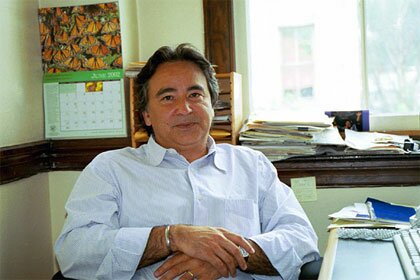
People were surprised when we came together to pass the billboard law, you know, they thought we could never pass the bottle deposit law. But we did. They thought we could never achieve same-sex equality. But we’re doing amazing things in Vermont, despite the leadership, in a sense. And I want people to think about what it would be like to actually have the leadership that reflected what Vermonters thought was important.
VDB: Well, in defense of the Legislature and Howard Dean, they passed civil unions, and Dean signed it. And granted, he did it under wraps, but I do give him great credit for that.
Pollina: [Nodding slowly, taking the point] And I do as well.
VDB: You said, three last things. Did I cut you off before you got to the third?
Pollina: And the last thing I would just mention, in the context of a lot of this stuff about the election, is Bernie Sanders. You know, in terms of being able to cross party lines, reaching out to people in the Northeast Kingdom as well as in Burlington, being able to get Vermonters to think differently about leadership — there were times when people said Bernie Sanders will never win statewide office. So I would just remind people of that.
VDB: Funny you’d bring that up, because I have a question about him that’s always nagged at me. To my mind, Bernie is synonymous with the Progressive movement, and yet in certain ways he’s not been the most outspoken proponent of other Progressives as they’ve tried to make the leap to statewide office.
In your earlier campaigns, I was surprised that what support came from him seemed to come late, it seemed never to be quite at the level you’d expect, given that you did senior policy for him for five years or so. I always expect something more brothers in arms from him. What can you say about that?
Pollina: Well, first of all, Bernie is an Independent, and I think he prefers to maintain the clarity of his independence, as much as he possibly can. It has allowed him to maintain the strength of support he has among Vermonters, and the respect they have for him. And I think that’s very important to him, and I do respect that.
When I ran for Lieutenant Governor, this may have been a little bit below the radar screen perhaps, but I actually attended numerous events of his — you know, BBQs from Newport to Bennington, and we did spend a lot of time together in that race. I basically attended many of his events, and spoke at them, not just attended. I sort of felt like the third wheel, but he introduced me as the person who would be and should be the next Lieutenant Governor.
So he was very supportive in that race. But mostly he wants to maintain his independence. He is consistent. It’d be one thing if he was out there endorsing ten other people, and ignoring me but he’s not.
VDB: Sure. I just feel that in a situation like this — with your candidacy at something of a tipping point — he could do a lot if he’d come forward and say, “Look, I’m going to be full-throated in my endorsement of Anthony, and I’m going to be talking up his candidacy.” I just put that out there in case any of Bernie’s staff happen to be listening —
Pollina: [Final, quick smile] Or reading, as the case may be.


